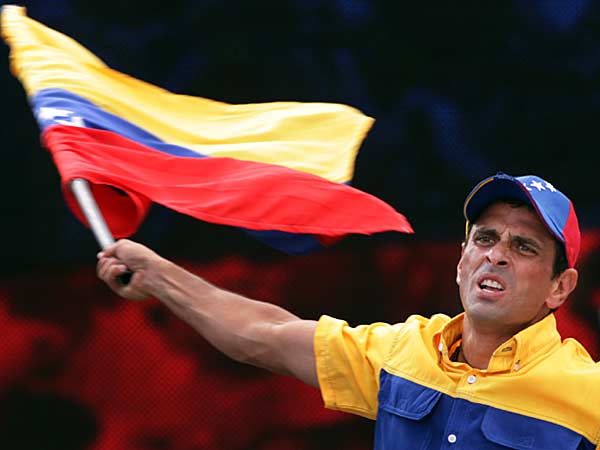
The leader of Venezuela’s opposition, Henrique Capriles, has urged the army to choose whether it is “with the constitution or with [President Nicolas] Maduro”, after a state of emergency was declared.
President Nicolas Maduro has announced a 60-day emergency, giving soldiers and police wider powers to deal with the country’s spiraling economic crisis.
Henrique Capriles said the decree gave the president unconstitutional powers.
The opposition leader called on Venezuelans to ignore it and take to the streets on May 18.
He told reporters: “We, Venezuelans, will not accept this decree. This is Maduro putting himself above the constitution.
“To impose this, he’d better start preparing to deploy the war tanks and military jets.”
“And I tell the armed forces: The hour of truth is coming, to decide whether you are with the constitution or with Maduro,” Henrique Capriles said.
He said the opposition was not calling for a military coup, but instead seeking a legal and constitutional way of ousting Nicolas Maduro through a recall referendum.
The state of emergency is in place for 60 days and can be renewed for another 60.

The decree was rejected by the opposition-held National Assembly late on May 17, but Nicolas Maduro had indicated that he would not abide by their decision.
At a press conference with foreign journalists in Caracas, Nicolas Maduro said the National Assembly had “lost political validity.
“It’s a matter of time before it disappears,” he added.
Nicolas Maduro also said that the opposition had missed the deadline for the referendum and falsified signatures.
Opposition politicians began the process two weeks ago by handing in a petition signed by 1.85 million people, well above the 1% of voters on the electoral roll needed to kick-start the process.
Venezuela’s constitution says that a referendum will be called to decide if the president remains in power if a second petition is signed by at least 20% of the electorate, or nearly four million people.
However, the government has already made it clear that the referendum will not go ahead.
Nicolas Maduro accused the United States of leading a plot to deploy foreign troops in his country, and force him from office.
He told foreign journalists that a US military plane entered Venezuelan air space twice last week without authorization.
Politicians and media from outside the country have been trying to sow chaos in Venezuela to justify intervention, he said.
“This whole campaign, has a centre. There is an axis: Madrid, Miami and Washington,” he said.
“But there is a centre of planning, of direction, lobbying, strength and funding. That centre is located in Washington.”
Nicolas Maduro promised to fight back and to do everything in his power “to continue winning the battle for internal peace”.
He also made reference to the recent suspension of Brazil’s President Dilma Rousseff to face an impeachment trial.
Nicolas Maduro described the process as a coup, backed by foreign powers.
Venezuela is facing a serious economic crisis, with high inflation and shortage of many basic goods.
Nicolas Maduro accuses Venezuela’s elite of boycotting the economy to achieve its political goals.
The opposition blames the mistaken policies of Nicolas Maduro and his predecessor, Hugo Chavez, for the crisis.